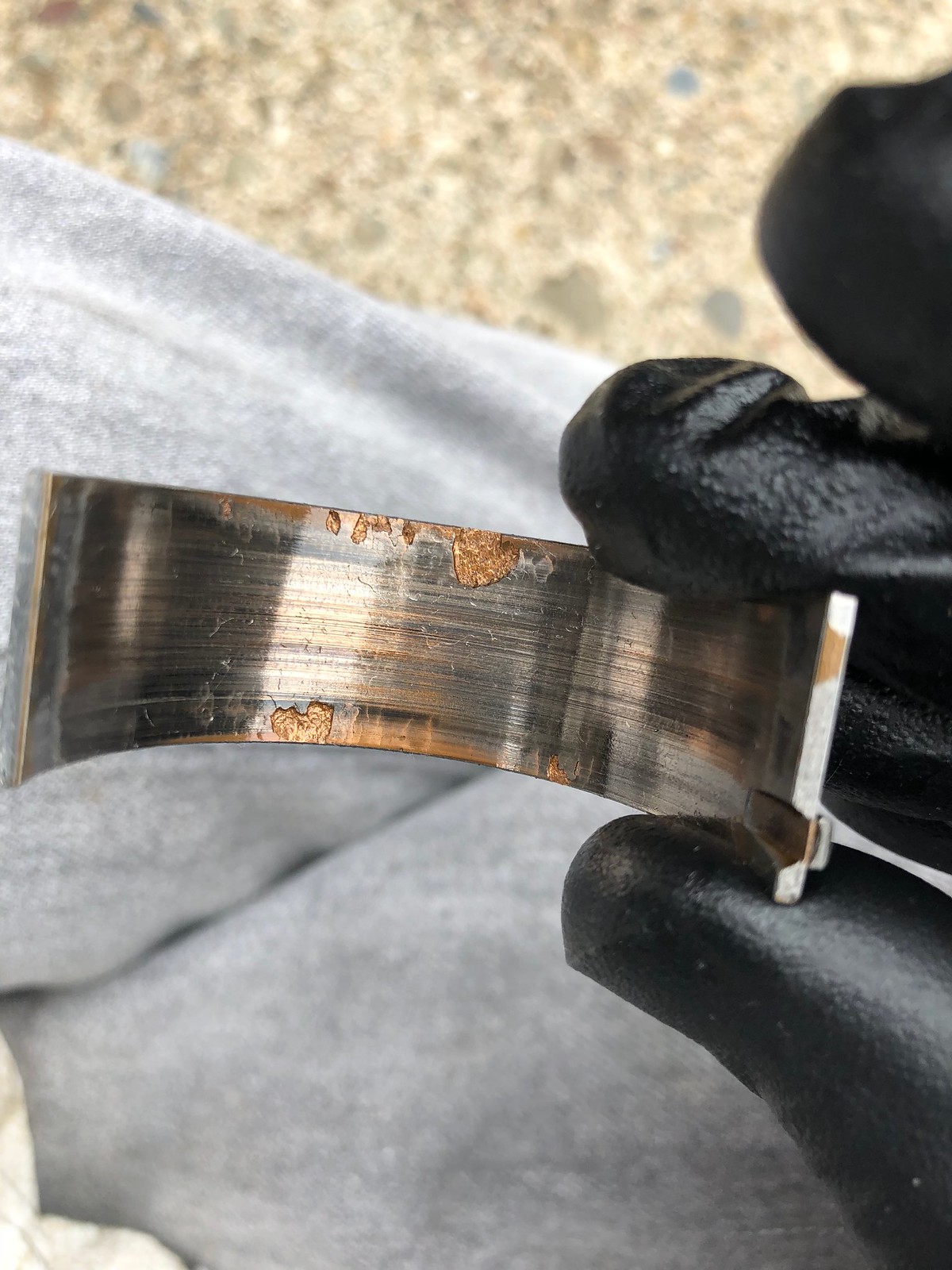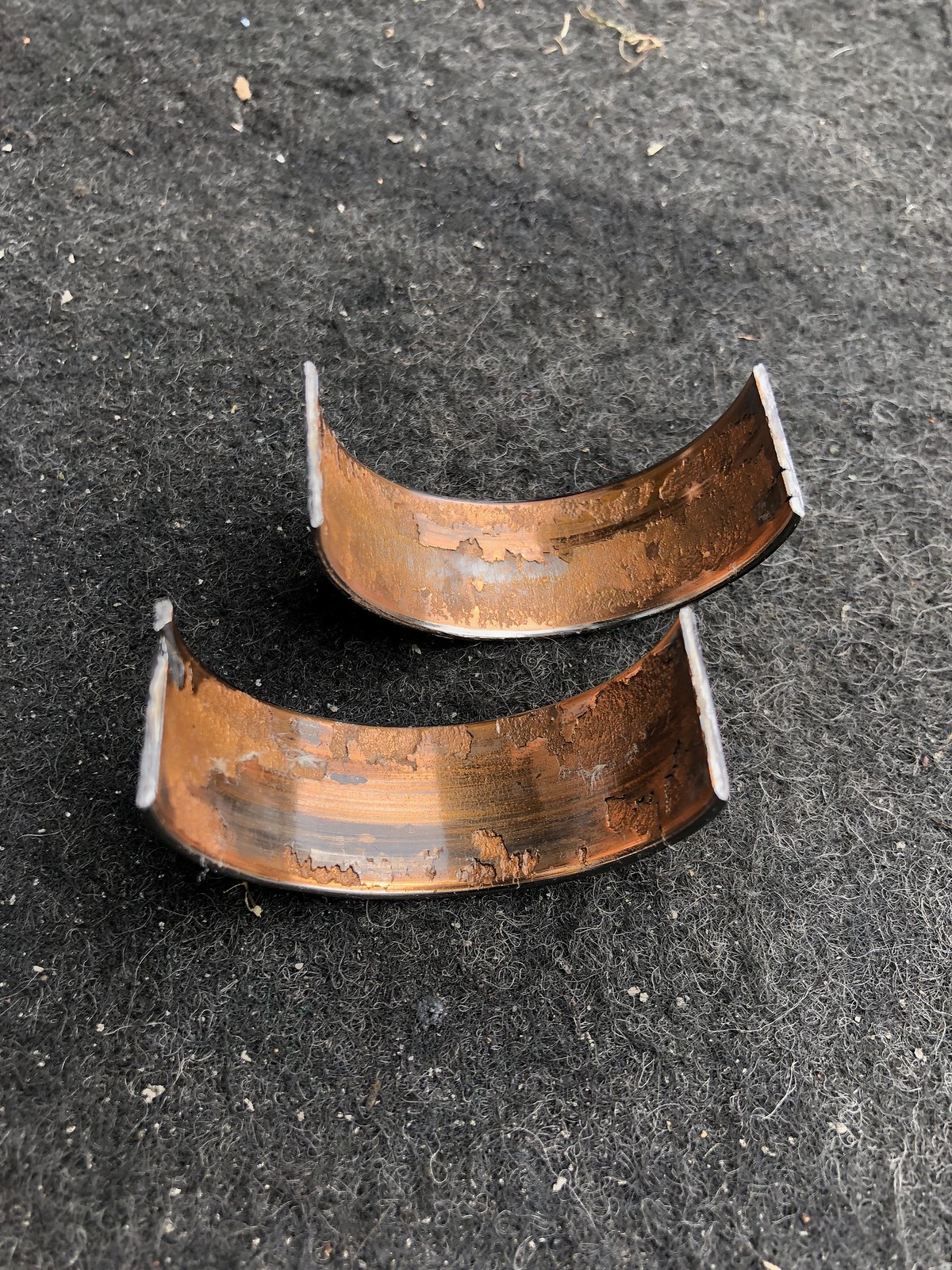This was cyl. #1...seemed pretty bad:

but it kept getting worse until we got to cyl. #4 (which I'd suspected had been the cause of my long-term rod-knock):

My friend said they were the worst rod bearings he'd ever seen.
This story actually goes back quite a while: Mike W. may remember way back in 2008 at 5er Fest Reno commenting that my white 528e (at that time ~195k miles) had "light" rod knock. This worried me for a while, but it was "light" and I was doing regular (5k) oil changes with Castrol GTX 20w50, it was living an unstressed life tied to an automatic transmission, and the car quite frankly had other more pressing issues, so I slowly learned to ignore it "until it got louder." Later that fall (at 205k), I did a top-end "e2i" conversion and drove it to ~244k before putting it in storage due to financial issues in 2011. The rod knock never got louder, in spite of frequently spinning it well-past the engine's original 4,850 rpm redline.
In 2015 I took it out of storage with 244k on the clock, got it's running issues sorted and drove it until the automatic transmission decided to bleed-out one day at 246k. This prompted a manual transmission and differential swap to finally take advantage of the extra power. Even then the rod knock never got worse. That is until the day I couldn't get my drain plug out for an oil change...and after several failed weekends I folded and took it to a "reputable local shop" before I broke or stripped something.
When I picked up my car from this "reputable" shop, I noticed on the invoice that I'd been charge for six quarts of Synthetic 5w30...not the non-synthetic 20w50 I'd specifically requested over the phone when I'd made my appointment. The shop's head mechanic reassured me that they use the synthetic 5w30 all the time on m20s (in e30s) without issue, even on high mileage engines. I made a stink and he offered to change it, but I said I don't want them touching my car again and I'd change it at home, so he gave me a quart extra in case it leaked through my old seals until my next change and I took my car and left.
That said...I didn't actually end up changing the oil until ~3000 miles later, figuring that it wouldn't really hurt the once and they'd assured me they'd done it all the time without issue....and they were supposedly a "good shop with an excellent reputation". Well, about 2500 miles into the 5w30 the rod knock decided to make itself re-known, and by 3000 it was an absolutely horrid-sounding death-rattle. Changing the oil made no difference at thus point, it was over, the bearings were done. After an annoying few weeks of bad weather and delayed shipping, a friend came over (derrith on this forum) and provided some much-needed expertise, tooling and muscle to help swap all the rod bearings, and the photos above are the result.
The rod knock is completely gone, the crank itself looked undamaged, and the bottom-end of engine and oil pain were surprisingly clean for a 250k mile engine, no sludge, just a few coppery flakes from the above bearings (obviously). I do believe that the frequent changes with high-quality oil were the only thing that allowed me to continue driving it like that without it getting worse for another 60k+ miles before it finally went. In fact I don't think it was as loud in 2016 before the 5w30 as it was in 2008 before I started the 5k regimen of 20w50 Castrol GTX. I was glad to be right in suspecting all along (as early as 2009) that cylinder 4 was the culprit (at least the worst). The car had seven owners before me and was clearly never cared for...the head had been replaced at some point in the past due to the car clearly overheating (paint was dull-ish over the head on the original hood, indicating heat), and so it's no surprise it had rod bearing damage when I got it at 185k in 2007. Either way, I'm glad that I was able to keep the original engine (well bottom-end) going even longer. I'm hoping to fully rebuild it at 300k to specifications which make more sense for the top-end modifications I've done, so I think another 45k isn't a tough ask considering the bearings are shiny and new. I'm now trying Kendall oil for the higher ZDDP content and claim to quality, so we'll see how hard an ask that actually is...


